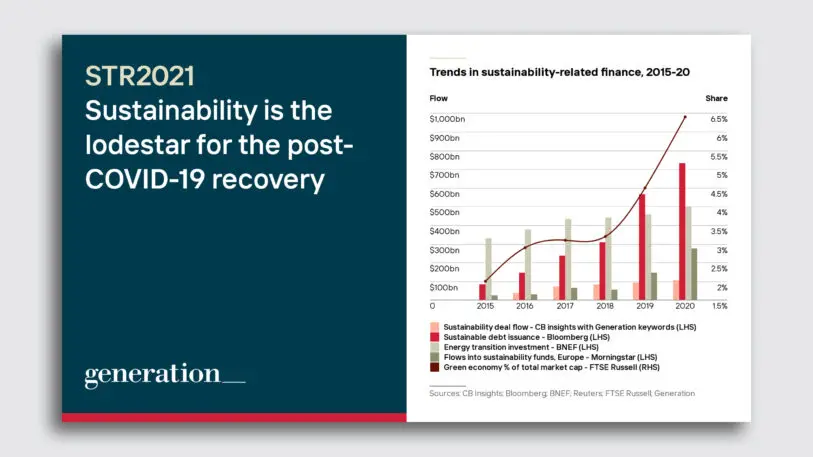Over the last year, as the pandemic reshaped the economy, the world also started to reach tipping points on sustainability. Renewables produced more energy than fossil fuels in Europe. There are 7 million electric vehicles on roads. The world’s biggest companies are committing to net-zero emissions. A new report from Generation Investment Management, the sustainability-focused investment firm founded by former Vice President Al Gore, takes a look at the landscape, pulling from more than 200 sources. Here are a few of the trends.
Net-zero goals are becoming the norm
More than three-quarters of the global economy is now covered by national commitments to reach net-zero greenhouse gas emissions by 2050. More than 2,000 companies have committed to net zero under the Race to Zero campaign. Some companies have gone a step further, like Microsoft, which plans to offset its historical emissions. Still, there’s a risk that many governments and companies won’t act quickly enough. The report notes that most don’t yet have credible plans with near-term goals.
Sustainable investment is growing
Since 2015, the amount of money flowing to environmental, social, and governance (ESG) funds has grown tenfold. Venture capital and private equity deal flow related to sustainability has doubled. Deals and investments in “natural solutions,” such as regenerative agriculture and plant-based meat, are growing. Investment in renewable energy may surpass upstream oil and gas investment this year. Investment in the circular economy, including digital resale platforms for used clothing, is growing. The percentage of the market cap coming from the green economy has tripled. The Net Zero Asset Managers initiative, an international group of asset managers launched last year, now has 128 signatories and $43 trillion in assets under management that are aligned with a goal of net-zero emissions by 2050.

Nature is under threat, but natural solutions are getting more support
A million species of plants and animals are at risk of extinction. The World Economic Forum estimates that $44 trillion in economic value, more than half of the world’s gross domestic product, is now at risk because of threats to nature. While many companies have climate goals, fewer have biodiversity goals. Some solutions, such as protecting forests, can help on both fronts, and are getting more investment. Other solutions are growing, such as plant-based meat, which can help reduce some of the huge amounts of land used for agriculture. Beef is still the largest reason that tropical rain forests are being lost.
The “15-minute city” is starting to reshape urban planning
After Paris mayor Anne Hidalgo championed the 15-minute city—the idea that it should be possible for city residents to make most everyday trips in 15 minutes on foot or by bike—politicians in other cities, like Seattle, have started pushing for the same idea, which can make urban areas more livable while it cuts emissions from commuting. During the pandemic, many cities added bike lanes or closed some streets to car traffic; some of these changes will become permanent. As more companies allow remote work post-pandemic, the number of commuters driving to work is likely to shrink.
We need to move faster
The world isn’t on track to cut emissions in half by 2030, a key step to keeping global warming under 1.5 degrees Celsius. Deployment of wind and solar power needs to happen eight times faster than current levels. Electric vehicle sales have to speed up 10 times faster. Green hydrogen, a type of renewable energy that can be used in industry or for heating or energy storage, needs to be rolled out 20 times faster. Overall, the energy transition needs to happen five times faster to stay on track.
Recognize your brand’s excellence by applying to this year’s Brands That Matter Awards before the early-rate deadline, May 3.
